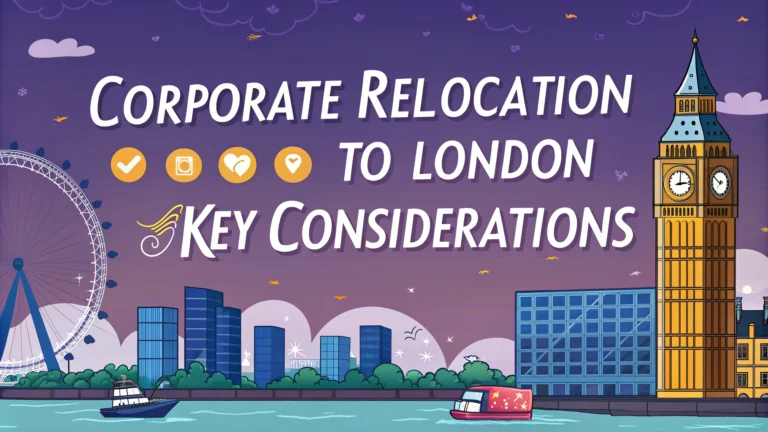Corporate relocation to London requires careful planning across multiple dimensions – from immigration requirements to office space selection and employee support.
A successful move involves understanding London’s unique business landscape, regulatory environment, and cultural nuances that can impact both company operations and employee satisfaction.
This guide outlines the essential steps and considerations for businesses planning to establish or relocate their operations to London.
Legal and Administrative Requirements
- Company Registration with Companies House
- VAT Registration (if applicable)
- Business Bank Account Setup
- Employment Law Compliance
- Insurance Requirements
Immigration and Work Permits
Companies must obtain appropriate sponsorship licenses to employ non-UK workers.
- Tier 2 Sponsorship License for skilled workers
- Right to Work checks for all employees
- Visa processing timelines (8-12 weeks average)
Office Location Selection
London’s diverse business districts offer different advantages for relocating companies.
| Area | Industry Focus | Average Rent (per sq ft/year) |
|---|---|---|
| City of London | Financial Services | £65-£85 |
| Canary Wharf | Banking/Finance | £45-£60 |
| Shoreditch | Tech/Creative | £35-£55 |
Employee Support Services
- Housing assistance programs
- School search services
- Cultural integration support
- Healthcare registration assistance
Transportation Infrastructure
Consider office locations near major transport hubs for employee convenience.
- Underground stations
- National Rail connections
- Airport accessibility
- Bus routes
Technology Infrastructure
- High-speed internet providers
- Data center availability
- IT support services
- Telecommunications setup
Professional Services Network
Establish relationships with local service providers:
- Legal firms
- Accounting services
- Real estate agents
- Recruitment agencies
- Banking partners
Cost Considerations
- Office rent and service charges
- Employee relocation packages
- Local salary expectations
- Insurance costs
- Technology setup expenses
Next Steps for Your London Move
Contact London & Partners (020 7234 5800) for free relocation support and guidance.
Schedule consultations with local real estate agents to begin office space search.
Connect with recruitment agencies specializing in your industry to understand the local talent market.
Timeline Planning
Establishing a realistic timeline is crucial for a smooth transition to London.
- 6-12 months before: Initial planning and legal preparations
- 4-6 months before: Office location selection and lease negotiations
- 3-4 months before: Begin visa and immigration processes
- 2-3 months before: Infrastructure setup and vendor selection
- 1-2 months before: Employee relocation coordination
Local Business Culture
Understanding British business etiquette enhances successful integration:
- Punctuality is highly valued
- Formal business communication style
- Emphasis on relationship building
- Work-life balance expectations
Risk Management
Develop contingency plans for common relocation challenges:
- Brexit-related regulatory changes
- Currency fluctuation impacts
- Property market volatility
- Talent retention strategies
- Supply chain considerations
Building Your London Success Story
A successful corporate relocation to London requires meticulous planning, cultural awareness, and strong local partnerships. Focus on creating a comprehensive strategy that addresses both immediate logistical needs and long-term business growth objectives.
- Maintain regular communication with stakeholders
- Document lessons learned throughout the process
- Review and adjust plans based on feedback
- Build flexibility into your timeline
Remember that London’s business ecosystem offers numerous resources and support networks to help ensure your relocation success. Early engagement with local authorities and service providers will facilitate a smoother transition into one of the world’s leading business capitals.
FAQs
- What are the main business districts in London to consider for corporate relocation?
The main business districts include Canary Wharf, The City (Square Mile), Westminster, Mayfair, London Bridge, and King’s Cross. - What permits or visas are required for corporate relocation to London?
Companies need a UK Sponsor License to sponsor employees, and employees typically require either a Skilled Worker Visa, Intra-Company Transfer Visa, or Global Business Mobility Visa. - How long does the corporate relocation process to London typically take?
The complete process usually takes 3-6 months, including visa processing, office setup, and employee relocation arrangements. - What are the average commercial property costs in London?
Commercial property costs vary by district, with prime locations in The City ranging from £65-£125 per square foot annually, while Canary Wharf averages £45-£85 per square foot. - What tax considerations should companies be aware of when relocating to London?
Key considerations include UK Corporation Tax (currently 25%), VAT registration (if turnover exceeds £85,000), and employment-related taxes like National Insurance contributions. - What support services are available for employees relocating to London?
Services include relocation specialists, housing search assistance, school finding services, cultural training, and settling-in support. - How does transportation infrastructure affect corporate location choice in London?
Consider proximity to major transport hubs like airports (Heathrow, Gatwick, City), Underground stations, and major rail terminals for employee commuting and business travel. - What are the legal requirements for establishing a business entity in London?
Companies must register with Companies House, obtain necessary licenses, register for tax purposes, and comply with UK employment laws and data protection regulations. - How do utility and service costs compare to other major cities?
London utilities and services are generally higher than other UK cities but comparable to other global financial centers like New York or Hong Kong. - What insurance requirements exist for corporations in London?
Mandatory insurance includes employers’ liability insurance, while professional indemnity, public liability, and contents insurance are strongly recommended.







